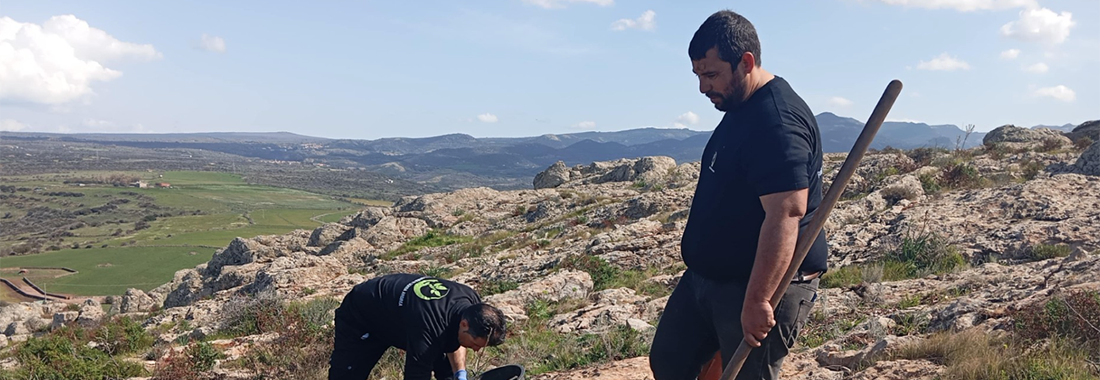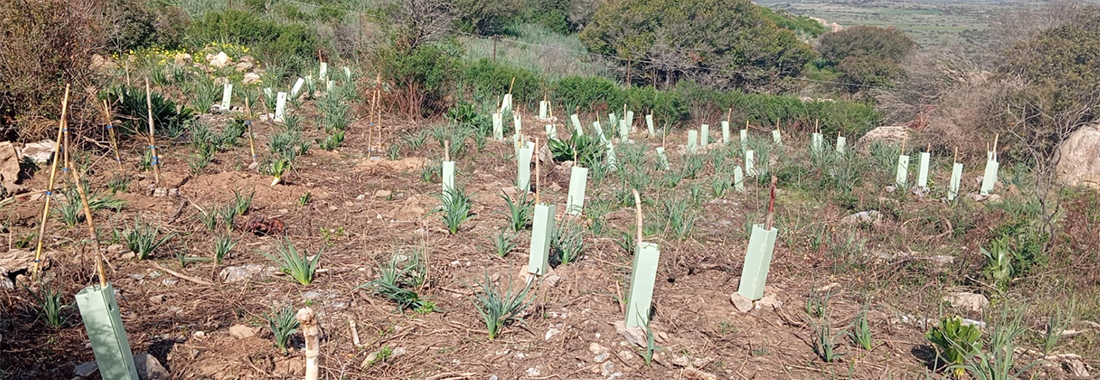The planting operations for the first Forest for Bees installation—a forest for bees—have been completed in Sennariolo (OR). This is a special one-hectare forest dedicated to bees and pollinators, essential insects for food security that have been in global decline for decades.
Alaterno, blackthorn, lavender, rosemary, broom, and helichrysum—around 1,500 plants in total—have been planted on the Santa Vittoria hill in Sennariolo (OR), all nectar-producing species typical of the Mediterranean scrub. This area was severely affected by the major Montiferru wildfire in July 2021, which devastated the local vegetation. Shelters (protective structures) and water basins (artificial ponds that retain water and allow insects to drink and survive) help maintain optimal conditions in a windy area of Sardinia that, like the rest of the Mediterranean, is facing rising temperatures and increasing drought due to climate change.
The site also includes a specially designed pathway to welcome groups of students from local schools.
Maria Francesca Nonne, forest expert and campaign manager for Forest For Bees at the MEDSEA Foundation, explains the project: "We aimed to preserve what was already there by designing a naturalistic planting—clusters of native, nectar-producing plants that had regenerated after the fire—complemented by small, wind-resistant plants that also benefit birdlife, such as the strawberry tree."
Globally, pollinator populations are in decline. Among them, bees play a key role in maintaining natural balance and ensuring food security. Bees are responsible for pollinating one-third of global crops and about 75% of all living plant species on the planet. Without this process, the availability of fruit, vegetables, nuts, and many seeds would drop drastically, with direct consequences for food security.
Since the 1990s, beehives have experienced dangerous mass die-offs, with at least a quarter of bee species in global decline.
MEDSEA’s goal is to create 15 hectares of nectar-producing forests distributed throughout Sardinia, beginning with the repopulation of one of the areas most affected by the Montiferru fire in July 2021.
This campaign has received support from global companies such as Patagonia and Roamers, as well as local ones like Copagri Oristano and Despar.
More donors are needed to expand these forests across Sardinia: join the campaign.
Latest news

A Forest for Bees Takes Root in Sardinia: Restoring Nature, Supporting Pollinators
The planting operations for the first Forest for Bees installation—a forest for bees—have been completed in Sennariolo (OR). This is a special one-hectare forest dedicated to bees and pollinators, essential insects for food…

MEDSEA Launches the Wetland4Change Project in Terralba to test and validate climate change's solutions
On Friday, March 14, 2025, in the council chamber of Terralba, MEDSEA held a meeting with the Municipality of Terralba to officially introduce Wetland4Change to stakeholders (productive activities, as well as institutional…

In Crete with ARTEMIS to protect seagrass meadows: 2nd Consortium Meeting
From March 4th to 6th, 2025, Heraklion (Crete) hosted the mid-term meeting of the ARTEMIS Interreg Euro-MED Natural Heritage project, organized by the Hellenic Marine Research Centre. This was a crucial moment to…

MEDSEA Heads to Tallinn for the Blue4All Consortium Meeting
Last January, the Blue4All project team gathered in Tallinn for the Consortium Meeting, marking the project's halfway point. The event, hosted by the local partner Keskkonnaamet/Estonian Environmental Board and the University of Tartu, brought together all 22 project partners from across…

ImPelaghiamoci: A Year of Initiatives to Learn About and Protect Cetaceans with the Municipality of Sassari
Promoting greater knowledge of the resident cetaceans in the Pelagos Sanctuary*, a transboundary marine protected area encompassing France, Liguria, Tuscany, and Sardinia, to improve the protection and conservation of these species…

Reforestation Operations Resume in Montiferru: A Forest for Bees by MEDSEA
Reforestation efforts in Montiferru, led by MEDSEA, are back on track. Following the planting of the first 5 hectares of olive trees, holm oaks, and Mediterranean shrubs, the focus now shifts to melliferous plants to…

25 Events in Sardinia for World Wetlands Day
Wetlands such as ponds, lagoons, lakes, rivers, and peatlands form an endless world of aquatic ecosystems. In Sardinia, the call to explore these habitats is open this February with the Sardinian edition of World Wetlands Day.

COASTRUST: Launching Sustainable Coastal Management in Domus de Maria Sardinia
The activities of the COASTRUST project, funded by the European Interreg Euro-MED program, have officially begun in Sardinia. The initiative aims to promote shared environmental management in the Mediterranean's coastal areas, addressing anthropogenic pressures…

Join the World Wetlands Day Sardinia 2025 Calendar: register your Event by January, 22nd
World Wetlands Day is celebrated every year on February 2, marking the adoption of the Convention on Wetlands signed on February 2, 1971, in Ramsar, on the shores of the…

MEDSEA joins the Camargue Red Alert with the Mediterranean Alliance for Wetlands to save birdlife
The MEDSEA Foundation has officially joined 73 other international organizations in signing the Camargue Red Alert, a collective call to action to safeguard the Camargue wetlands in France.

Wetland4Change: MEDSEA in Valencia to Explore Natural Climate Solutions Through Wetlands
The MEDSEA team participated in the second Consortium meeting of the Wetland4Change project in Valencia from November 26 to 28, 2024. The meeting was organized by local project partners, the…

Malta’s First Posidonia Meadow Restoration Project Led by MEDSEA Foundation
Different islands, but similar issues for marine ecosystems, which are heavily threatened by unregulated anchoring from recreational boating and illegal trawling. In Malta, as in Sardinia, the damage is particularly…

We are all at 'Valencia'-like risk, and here’s why
Le recenti inondazioni a Valencia sono un esempio tangibile di come gli eventi estremi legati al cambiamento climatico stiano aumentando in frequenza, intensità e durata, colpendo duramente il Mediterraneo, un vero e proprio…

Monitoring of Posidonia oceanica Meadows Begins in the Marine Protected Area of Capo Testa Punta Falcone
The monitoring activities of the Posidonia oceanica meadows in the Marine Protected Area (MPA) of Capo Testa Punta Falcone, located in Santa Teresa Gallura, have officially begun. In recent days, the marine…

MEDSEA joined the 7th TransformAr Consortium Meeting in Exeter
In Late September, the seventh Consortium Meeting of TransformAr took place in Exeter in South West England, organised by the partner Westcountry Rivers Trust, who are coordinating the Nature Based solutions in the…

Architecture and Environment of Wetlands at Costa Produttiva, September 8-14 in Marceddì
From September 8 to 14, Marceddì (OR) hosted Costa Produttiva, a multidisciplinary workshop that combines research, innovation, and sustainability for the future of our coasts. Organized by the DICAAR of the…
- 1
- 2
- 3
- 4


